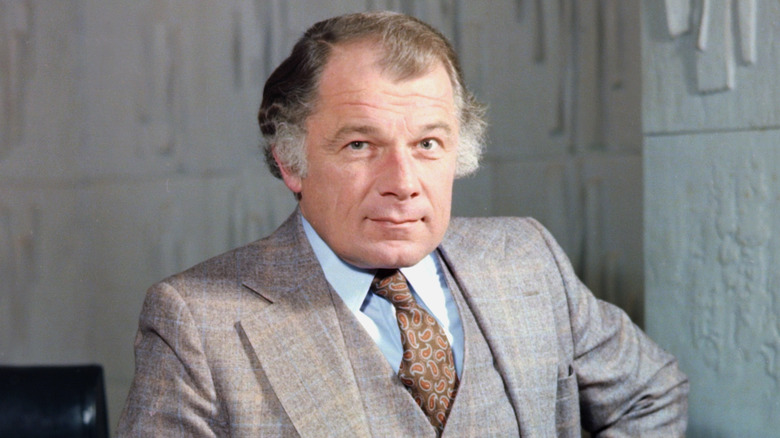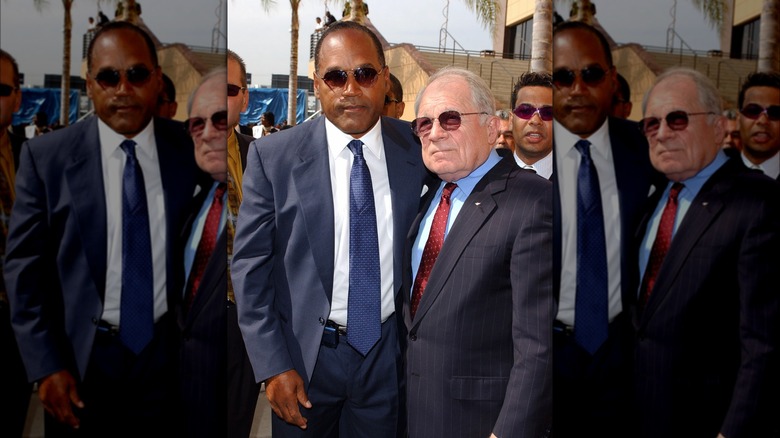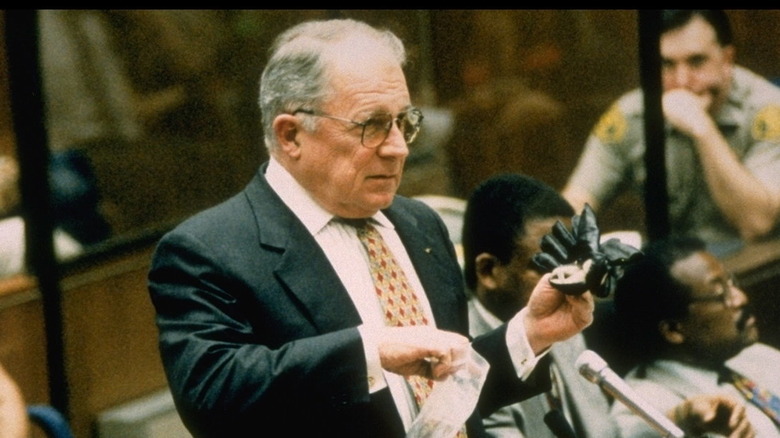What Happened To F. Lee Bailey, O.J. Simpson's 'Dream Team' Lawyer?
O.J. Simpson's case was unlike anything anyone had seen before, and it featured a dream team of lawyers who helped him get acquitted. While you may be familiar with the key players of Simpson's legal team, like Robert Shapiro and Johnnie Cochran, F. Lee Bailey was also an integral part of the group — but what happened to him since?
In 1994, Bailey was hired as part of Simpson's defense team after he was accused of killing his ex-wife, Nicole Brown Simpson. Even though it may have seemed the odds were stacked against him, Simpson's lawyers weren't going down without a fight. They centered their defense around authorities mishandling evidence, as well as insinuating that many LAPD officials were racist. Bailey may not have been considered one of the top dogs in the case but his cross-examination of Mark Fuhrman became a stand-out moment in the trial.
Fuhrman was a controversial LAPD figure who took the stand. Bailey addressed claims of Fuhrman being racist and using the n-word. Looking back at this case, this cross-examination stands as a crucial moment in the trial, as it showed that race could have played a part in the LAPD's investigation of Simpson. As everyone will recall, the former NFL star was acquitted and Simpson's dream team was praised for its success. However, in the years since, people have forgotten about the once-famous lawyers. Here's what Bailey has been up to since the '90s.
F. Lee Bailey kept in touch with O.J. Simpson
Communication between F. Lee Bailey and O.J. Simpson didn't end when the former NFL player was acquitted. In 2008, Simpson was arrested for a 2007 incident after he stole some of his old memorabilia. Simpson was sentenced to 33 years behind bars, but was released on parole nine years into serving his sentence. He left prison on October 1, 2017, and days later, he linked up with his former lawyer and friend, Bailey.
On October 17, 2017, just two weeks after his release, Simpson and Bailey were spotted having dinner at a Las Vegas hotel. Although it's unclear what the two spoke about at this get-together, it was evident they were still on good terms, having a deep conversation and hugging each other goodbye at the end of the night.
Bailey has always stood behind Simpson's innocence, even claiming certain evidence in his book, "The Truth About The O.J. Simpson Trial." In this book, O.J.'s reaction to the news of his ex-wife's death and the timeline of how the night unfolded supposedly demonstrated that O.J. could have never committed the murder. Bailey also claimed there was a witness who saw Nicole Brown Simpson and Ronald Goldman the night of the murder, but the witness never had the chance to testify because the LAPD quickly ruled him out after they had reportedly recorded misinformation. Up until his death, Bailey backed O.J. and his innocence as the two remained good friends.
F. Lee Bailey's fall from grace
O.J. Simpson's case wasn't the first high-profile trial of F. Lee Bailey's career. Bailey had an impressive career that included being on the defense team of other significant murder cases, so it's no wonder he was chosen to be on Simpson's team. Despite being highly respected and successful in his career, not long after Simpson was acquitted, Bailey's life turned upside down.
The early 2000s marked the downfall of the once-famous lawyer. In 2001, he was disbarred, leaving him unable to practice law in Florida because he took millions in trial compensation that wasn't rightly his. He was later disbarred in the state of Massachusetts for similar offenses. The troubles didn't end there as Bailey attempted to earn a license in Maine in 2012, but it didn't go over well, as the state rejected his efforts. Not only was he not allowed to do the one thing he loved, but Bailey was also in debt. After being unable to pay off a $5.2 million tax bill, he filed for bankruptcy.
Toward the end of his life, Bailey lived above girlfriend Debbie Elliot's hair salon. Despite his issues, the former lawyer never got too down about it. He told Town & Country, "I won't say it's depressing, because I don't think I ever get depressed." Still, Bailey's career took a turn for the worse, and he never truly recovered from it as he died on June 3, 2021 at age 87.



